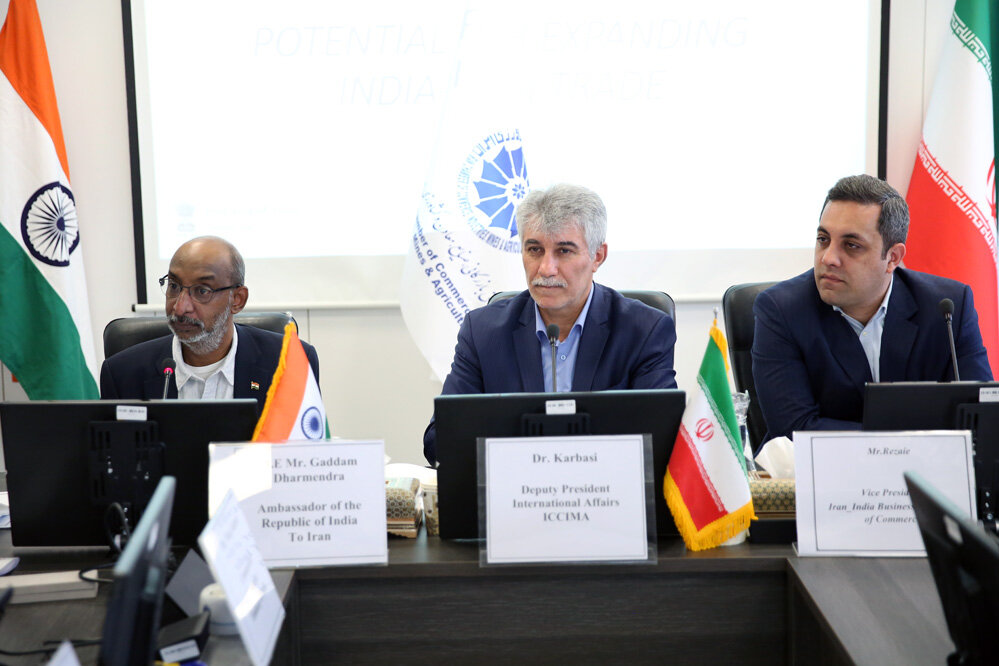Iran, India stress enhancement of economic relations

TEHRAN - Senior officials, entrepreneurs and representatives of private sectors from Iran and India gathered together in a business forum at the place of Iran Chamber of Commerce, Industries, Mines and Agriculture (ICCIMA) on Wednesday to discuss ways of expanding trade ties.
Indian Ambassador to Tehran Gaddam Dharmendra, ICCIMA Deputy Head for International Affairs Mohammad-Reza Karbasi, and representatives from Iranian foreign ministry and India’s IDBI and UCO banks were among the attendees of the event.
In the meeting Gaddam Dharmendra and Mohammad-Reza Karbasi delivered speeches and the two sides emphasized Iran and India’s determination for expansion of economic relations.
Great potentials of non-oil trade
Commencing the meeting, Karbasi underlined the long lasting trade relations between Iran and India and noted that the two sides should take necessary measures to boost trade relations, not only in the oil and energy sector but also in other areas like agriculture, services and industry.
“To increase the trade turnover between the two counties, we should not merely rely on oil sector and the focus must shift to other commodities and service areas and we should try to remove the barriers in the way of non-oil trade relations as well.” Karbasi said.
He mentioned industry, food, mining and minerals, steel, cement and fruit and agricultural products and leather goods as areas in which India could benefit from in trade with Iran.
The official suggested that the two countries foreign ministries and chambers of commerce should coordinate in order to facilitate the trade relations between the two countries provinces in order to exploit the full trade potential of the two sides’ non-oil sectors.
Boosting trade turnover to $30b in 2 years
Further in his remarks Karbasi put the trade turnover between the two sides in 2018 at $18 billion and expressed dissatisfaction with the level of non-oil trade, saying “Of the total trade exchange only $1.4 billion was accounted for by Iran’s no-oil exports to India and $13 billion came from oil exports.”
He pointed to the $30 billion trade target that the two countries have put on agenda and expressed hope that with the expansion of trade between the two sides private sectors this target could be realized within the next two years.
Strategic cooperation in Chabahar Port
Elsewhere in his remarks the deputy mentioned the two countries strategic cooperation in Chabahar Port and noted, “Since Chabahar Port is not under the U.S. sanctions it has great potential for boosting the trade between Iran and India and even with other countries in the region.”
“Considering India’s significant potential for bolstering trade with the CIS countries, Chabahar Port could facilitate the country’s trade acting as a hub for transshipping Indian goods to the destination countries.”
Bolstering banking relations
Karbasi further mentioned the agreements between the two countries on preferential trade and banking relations and noted that all these steps are an indication that the two countries are determined to boost and expand their trade ties beyond the current levels.
He noted that very positive negotiations were started during the Iranian Foreign Minister Mohammad Javad Zarif’s visit to India and banks from both sides are currently cooperating in order to keep the trade afloat.
The official mentioned the presence of the representatives from IDBI and UCO banks of India in the forum and took it as an indication of progressive banking relations between the two countries.
India determined to keep oil imports from Iran
Indian Ambassador to Tehran Gaddam Dharmendra for his part expressed his country’s willingness for developing relations with Iran on various areas especially in energy sector.
“After U.S. reimposed sanctions on Iran, we immediately started exploring ways for keeping our trade ties with Iran especially in the energy and in this regard we used our previous experiences with the previous rounds of sanctions.” the ambassador said.
Asked by Tehran Times about India’s negotiations with the U.S. for extending the waivers for oil imports, the ambassador noted that a delegation from his country is currently in Washington to negotiate with the U.S. in order to extend the waivers beyond May.
He expressed hope that the U.S. will be convinced to extend the waivers for India and his country will be able to keep shipping in Iranian crude oil.
Asked about the possible changes in the level of oil imports from Iran, Dharmandra said, “we should just wait and see but we hope to keep the imports at the current level of 300,000 barrels if not higher.”
“Two of our refineries are exclusively using Iranian crude oil and we cannot modify them easily, so we have to maintain our oil imports from Iran.” The official told the Tehran Times.
Iran, India’s Special Purpose Vehicle (SPV)
Dharmandra further mentioned the special purpose vehicle (SPV) that Iran and India are currently using for trade, saying “At the time that the EU was still negotiating the INSTEX, India and Iran had already established their own SPV and this trade channel has been operational for over six months now.”
Explaining the SPV, the official said, the revenues from Iranian exports to India will be exchanged to rupee and reserved in the country and in coordination with certain Iranian banks, two Indian banks of IDBI and UCO will exchange the revenue for basic goods and commodities which Iran imports from India.
The official further called on Iranian companies and private sector to look beyond the traditional trade items like rice and tea and also take into consideration cooperation in other sectors like medicine, pharmaceuticals, technology and even meat products.
